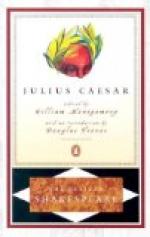|
This section contains 15,572 words (approx. 52 pages at 300 words per page) |

|
SOURCE: "The Crisis of the Aristocracy in Julius Caesar," in Renaissance Quarterly, Vol. XLIII, No. 1, Spring, 1990, pp. 75-109.
In the essay that follows, Rebhorn argues that Julius Caesar is less about regicide than about the self-destruction of the Roman aristocratic, senatorial class through its members' efforts to outdo one another in greatness, and that Shakespeare uses the play as an analogy for the demise of an equally envious and self-destructive aristocracy in Elizabethan England.
"The purpose of playing . . . is to hold, as 'twere, the mirror
up to nature, to show virtue her feature, scorn her own image,
and the very age and body of the time his form and pressure"
(Hamlet, 3.2.20-24).1
In his hagiographic treatment of the life of Sir Philip Sidney, Fulke Greville presents the last events in his hero's existence as constituting a particularly exemplary "tragedy"; he celebrates Sidney's generosity towards a common soldier in...
|
This section contains 15,572 words (approx. 52 pages at 300 words per page) |

|


